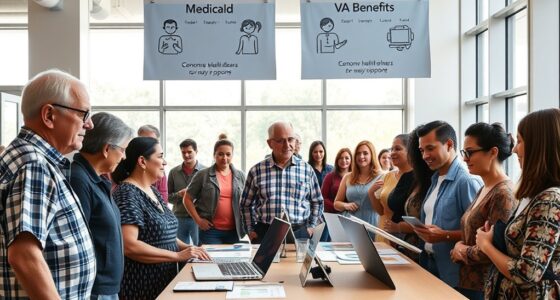You've got access to fantastic online caregiving resources available 24/7! Check out the AARP Caregiving Resource Center for tips, the Family Caregiver Alliance for support, and the Alzheimer's and Dementia Caregiver Center for specialized tools. You can also connect with CancerCare Support Groups for emotional help, explore caregiver apps for management, and visit ALS Care Connection. Don't forget Local Area Agencies on Aging for community support and the Care Matters E-Newsletter for important updates. There's so much more to discover!
Key Takeaways
- The AARP Caregiving Resource Center offers articles, message boards, and webinars available 24/7 for caregivers seeking support and information.
- Family Caregiver Alliance provides a 24/7 helpline offering confidential support in over 200 languages to assist family caregivers.
- The Alzheimer's and Dementia Caregiver Center features online message boards and resources for caregivers, ensuring access to support at any time.
- CancerCare Support Groups provide online and in-person options for caregivers, creating a safe space for sharing experiences and coping strategies 24/7.
- Local Area Agencies on Aging offer resources like meal programs and respite care, ensuring caregivers have support available whenever needed.
AARP Caregiving Resource Center

When you step into the role of a caregiver, the AARP Caregiving Resource Center is an invaluable ally. This platform offers essential caregiver support through helpful articles tailored for beginners, guiding you in maneuvering your new responsibilities.
You'll find a pill identifier tool that simplifies medication management, ensuring accurate prescriptions and dosages for your loved ones. Engaging with active message boards lets you connect with a supportive community, where you can share experiences and seek advice from others facing similar challenges. Additionally, it's important to remember that open communication about feelings can greatly enhance the caregiving experience, especially when dealing with emotional changes. Understanding baby emotions can also help you better interact with younger individuals in your care.
Additionally, AARP provides webinars and guides designed to enhance your skills and knowledge, helping you balance your caregiving duties while prioritizing your well-being. Equip yourself with these resources for a smoother caregiving journey. Understanding advance directives can also play a critical role in making informed medical decisions for your loved ones.
Family Caregiver Alliance

The Family Caregiver Alliance (FCA) is an essential resource for the millions of family caregivers steering their roles. They provide a thorough range of support tailored specifically for you, including educational materials, webinars, and support groups.
With a 24/7 helpline, you can connect with confidential support and advice in over 200 languages, ensuring you get the care you need anytime. The FCA emphasizes your well-being, offering programs designed to manage stress and improve health.
Their discussion groups foster community connections, allowing you to share experiences and learn from others. Plus, their website offers valuable information on balancing work and caregiving, helping you navigate your dual responsibilities effectively.
You're not alone—FCA is here to support you!
Alzheimer's and Dementia Caregiver Center

If you're caring for someone with Alzheimer's or dementia, the Alzheimer's and Dementia Caregiver Center has specialized support resources just for you.
You can find caregiver training tools that equip you with the skills needed to handle unique challenges.
Plus, connecting with others through message boards can provide the encouragement and community you need.
Specialized Support Resources
Caring for someone with Alzheimer's or dementia can feel overwhelming, but specialized support resources are available to help you navigate this journey.
The Alzheimer's and Dementia Caregiver Center offers various online tools tailored specifically for caregivers like you. You can access training materials focused on effective communication and daily care strategies that meet the unique challenges of dementia.
Additionally, the community-resource finder helps you locate local support services that cater to your needs. Online message boards provide a space for you to connect with peers, share experiences, and seek advice.
Informative webinars and fact sheets are also available, enhancing your knowledge and skills to improve the quality of care you provide.
Don't hesitate to explore these essential resources!
Caregiver Training Tools
While steering through the complexities of caregiving for someone with Alzheimer's or dementia, having access to effective training tools can make a significant difference.
The Alzheimer's and Dementia Caregiver Center offers a range of caregiver training tools that equip you with essential skills for managing daily challenges. You can explore specialized training modules covering communication strategies, daily care routines, and safety measures to enhance the quality of care you provide.
Additionally, the center's community-resource finder helps you locate local support services tailored to your needs. Interactive message boards foster a supportive community where you can share experiences and seek advice.
Stay informed with regularly updated webinars and educational materials, ensuring you're equipped with the latest best practices in dementia care.
CancerCare Support Groups

If you're a caregiver for someone with cancer, CancerCare Support Groups offer tailored options that can truly help you.
You'll connect with others in similar situations, fostering a sense of community while sharing experiences and coping strategies.
These groups not only provide emotional support but also practical advice to ease your journey.
Tailored Support Options
Steering through the challenges of caregiving can feel overwhelming, but CancerCare's support groups offer a lifeline for those in this role.
These groups are tailored specifically for caregivers, creating a safe space where you can share your experiences and gain insights from others facing similar challenges.
With online options, you can connect and receive emotional support from the comfort of your home.
Expert-led discussions focus on coping strategies, resources, and the emotional toll of caregiving, helping you navigate your journey.
CancerCare's support groups cater to various needs, including in-person, telephone, and online formats, ensuring there's something for everyone.
Community Connection Opportunities
Participating in CancerCare's support groups not only connects you with others facing similar challenges but also enriches your caregiving experience.
These online support groups offer a safe space for you to share your journey, gain insights, and seek advice from fellow caregivers who understand the unique struggles involved in home care.
You'll benefit from expert-led discussions and resources designed to enhance your caregiving skills, making your role more manageable.
The flexibility of attending from home means you can easily fit these sessions into your busy schedule.
By engaging in peer-to-peer interactions, you'll foster camaraderie and shared learning, helping you feel less isolated while maneuvering through the complexities of caregiving.
Join today and strengthen your community connection!
Caregiver Tools and Apps

Caregiver tools and apps are essential for streamlining the often overwhelming responsibilities of caring for a loved one.
With apps like CareZone, you can organize care information, manage medication schedules, and create to-do lists to enhance your Care at Home experience. An activities calendar feature helps you track appointments and daily tasks, ensuring nothing gets overlooked.
You can also share updates through blogs and messaging features, making it easier to communicate with family and healthcare providers about your loved one's status. Many of these tools offer centralized information storage, simplifying access to medical records and notes. Additionally, incorporating pet therapy into caregiving routines can enhance emotional well-being for patients with conditions like dementia and Parkinson's.
Nationwide Virtual Support Groups

Finding support is just as important as using tools and apps to manage caregiving responsibilities. Nationwide virtual support groups offer you a safe space to connect with others facing similar challenges from the comfort of your home.
Conducted via Zoom, these online meetings provide practical guidance and foster camaraderie among participants. You'll join a diverse community, exchanging best practices and personal stories that enhance understanding and support. Research shows that emotional regulation is crucial for managing stress effectively, which can be especially beneficial in caregiving contexts.
The virtual format guarantees you can participate regardless of your location, breaking down barriers to connection. Many caregivers report feeling less isolated and more empowered through the shared knowledge and emotional support found in these groups. By prioritizing self-care practices, you can enhance your overall well-being while navigating your caregiving journey.
Embrace this opportunity to strengthen your caregiving journey and build lasting relationships.
ALS Care Connection

The ALS Care Connection makes it easier for you and your family to manage daily responsibilities by coordinating community volunteers.
With a private online calendar, you can organize support from friends, neighbors, and local groups.
This platform not only streamlines caregiving tasks but also fosters a strong support network to help lighten your load.
Community Volunteer Coordination
While maneuvering the challenges of ALS can feel overwhelming, the ALS Care Connection offers a practical solution through its private online calendar. This tool helps you coordinate support from friends and community volunteers, ensuring organized assistance for your loved one.
By encouraging the involvement of neighbors and local organizations, you'll find much-needed help to ease the burden of caregiving. This platform streamlines communication and task management, fostering collaboration among your support network.
As you connect with others, you can effectively manage day-to-day challenges, allowing you to focus on providing compassionate care to your loved one. With the ALS Care Connection, you're not alone; support is just a click away, enhancing the quality of care for those impacted by ALS.
Daily Responsibilities Management
Managing daily responsibilities can feel challenging when caring for a loved one with ALS, but the ALS Care Connection simplifies this process. This platform helps you coordinate schedules and tasks among caregivers and volunteers, ensuring support is always available.
Here's how you can make the most of it:
- Use the private online calendar to track caregiving shifts and responsibilities.
- Engage local resources like friends and neighbors to form a supportive network.
- Organize community volunteers to assist with daily activities, reducing your load.
- Share caregiving duties to alleviate the burden and enhance overall care quality.
Family Support Calendar
Coordinating care for a loved one with ALS can be overwhelming, but the Family Support Calendar within the ALS Care Connection makes it easier to stay organized.
This private online calendar offers information to help families manage care tasks and schedules effectively. You can coordinate assistance from friends, neighbors, and local organizations, ensuring daily responsibilities are met without added stress.
By using the Family Support Calendar, you can easily delegate tasks and track who's helping with what, creating a collaborative environment. The calendar simplifies communication among multiple caregivers and supporters, helping you stay on top of everything.
Plus, you can access the ALS Care Connection platform anytime, giving you the tools you need to manage care efficiently, 24/7.
Care Matters E-Newsletter

The Care Matters E-Newsletter is an essential resource for caregivers managing the complexities of ALS care. By subscribing, you gain access to significant resources to manage your caregiving journey effectively.
Here's what you can expect:
- Timely updates on ALS care, including news and disease management.
- Valuable insights on ongoing research, keeping you informed about the latest developments.
- Tips and strategies for enhancing both your physical and emotional well-being.
- Community connection, allowing you to share experiences and learn from others in similar situations.
This newsletter empowers you with knowledge and support, making your caregiving experience more manageable and informed.
Don't miss out on this essential resource!
Local Area Agencies on Aging

Finding support is essential for caregivers maneuvering the challenges of ALS care, and Local Area Agencies on Aging (AAA) can be a valuable ally.
These agencies offer a range of services tailored to meet your community's needs, including meal programs, transportation, and caregiver support. They connect you with respite care options, allowing you to take necessary breaks while ensuring your loved one receives care.
Many AAAs also provide chore and yard maintenance services, helping to lighten your load. Plus, they offer educational materials and workshops, enhancing your skills as a caregiver.
If you're involved with the Alzheimer's Association, AAAs can complement your resources, ensuring thorough support for both you and your loved one.
Online Caregiver Support Communities

Many caregivers discover that online support communities can be a lifeline amidst the challenges they face.
These platforms offer a space where you can connect with others who understand your journey. Here are some key benefits:
- 24/7 Access: Participate in forums anytime, sharing experiences and seeking advice whenever you need it.
- Specialized Groups: Join communities focused on specific conditions like Alzheimer's or cancer, connecting with those facing similar challenges.
- Educational Resources: Access webinars and fact sheets that enhance your knowledge and caregiving skills.
- Real-Time Support: Utilize chat options and message boards for immediate feedback from peers and experts.
Frequently Asked Questions
What Are the Two Main Programs Available in Caregiver Support Services?
Two main programs available in caregiver support services are the Family Caregiver Alliance and AARP's Caregiving Resource Center.
The Family Caregiver Alliance offers support groups and educational resources tailored to enhance your skills and well-being.
Meanwhile, AARP provides articles, tools, and a message board that promotes community interaction, helping you understand your responsibilities and access essential information.
Both programs are designed to empower you and improve your caregiving experience.
How Much Does It Cost to Have a Caregiver Come to Your Home?
Hiring a caregiver can feel like spending a fortune, but it doesn't have to break the bank.
On average, you'll pay between $20 to $40 per hour, depending on your care needs and the caregiver's experience.
If you need full-time help, expect to fork out anywhere from $1,500 to $5,000 monthly.
What Resources Do Caregivers Need Most?
As a caregiver, you need several key resources to thrive.
First, access to educational materials can enhance your skills in managing chronic conditions.
Emotional support is essential; connecting with others in support groups can help you combat stress and burnout.
You'll also benefit from tools for organizing care and maintaining health records.
Finally, financial and legal planning resources can guide you through the complexities of caregiving, ensuring you're prepared for future challenges.
How Much Does the Government Pay Caregivers?
The government doesn't pay caregivers a flat salary; instead, compensation varies by state and program.
You might find options like Medicaid that can reimburse family caregivers under certain conditions. Some states offer Cash and Counseling programs, allowing for direct payments.
Rates can fluctuate, typically ranging from $10 to $25 per hour.
If you're caring for a veteran, you may also qualify for stipends through the Department of Veterans Affairs.
Conclusion
In your caregiving journey, remember you're not alone. You can find support through dedicated resources, connect with others who understand, access valuable tools, and stay informed. From AARP's extensive guides to local agencies that cater to your needs, each resource is a lifeline. Embrace the help available, engage with communities, and empower yourself with knowledge. By reaching out, you're not just caring for others—you're caring for yourself, too. Let these resources guide you every step of the way.









